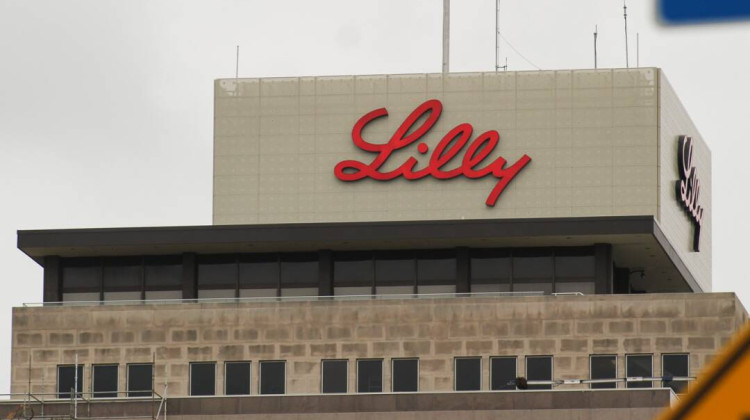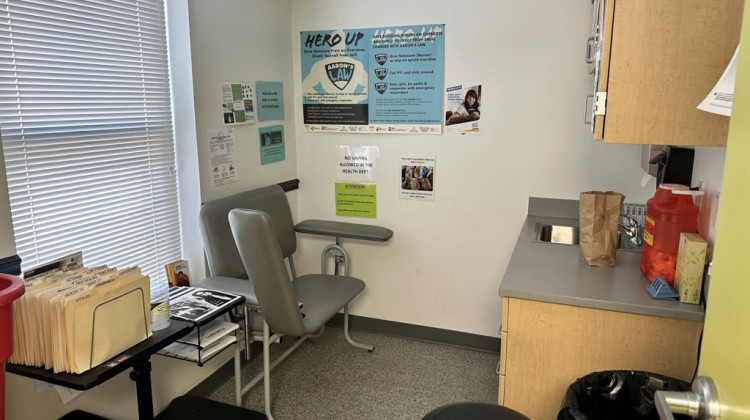
Eli Lilly was named in a Senate report raising concerns about conflicts of interest between telehealth companies and drug manufacturers.
File Photo / WFYIA Senate report released earlier this month raises concerns about emerging relationships between direct-to-consumer telehealth websites and drug companies Eli Lilly and Pfizer.
The nine-month investigation, led by Illinois Democratic Sen. Dick Durbin, stated that these relationships raise questions about a potential conflict of interest, leading to overprescription of drugs produced by the two companies.
Lilly's LillyDirect and Pfizer's PfizerForAll platforms, both launched in the past year, are designed to make it easier for patients to fill prescriptions, book appointments, and connect with health care professionals virtually and in-person. The websites also include informational videos and patient education materials.
LillyDirect focuses on care for obesity, migraine, diabetes and Alzheimer's treatments. PfizerForAll offers similar resources for migraines and menopause treatments in addition to pages that help patients schedule COVID-19 vaccine appointments.
At the center of the Senate investigation, however, is a specific feature: With just a few clicks on the user-friendly interfaces, the platforms can route patients to third-party telehealth care providers, who are free to prescribe any medications. But Senators argue that this system may be influencing prescription habits, resulting in subpar patient care and increasing federal health care spending.
The telehealth companies partnering with Eli Lilly and Pfizer — and cited in the Senate report — include UpScriptHealth, Cove, Form Health, Populus, and 9amHealth. None of these companies responded to Side Effects Public Media's request for comment.
Using data obtained through direct correspondence with the drug makers and telehealth companies, reviews of company websites, and federal sources such as the Open Payments Database and Medicare information, lawmakers explored how often patient interactions with these telehealth companies led to a prescription — particularly one for a drug made by either Eli Lilly or Pfizer.
Between July and December of last year, a total of just 4,394 patients accessed a telehealth provider via LillyDirect's platform: 3,759 through the obesity care company Form Health, 620 through the obesity and diabetes care company 9amHealth, and just 15 through the migraine care company Cove. While just 325 patients accessed a telehealth visit on UpScriptHealth via the PfizerForAll platform between August 2024 and January 2025.
For the telehealth companies working with Eli Lilly, roughly 74% of patients routed through them ended up receiving a prescription. And in the case of Cove, 100% of patients received a prescription.
UpScriptHealth posted similar numbers, with 85% of the 325 patients who did a telehealth visit through the platform receiving a prescription.
Patients using 9amHealth were also six times more likely to receive an Eli Lilly prescription, and 66% of all Form Health prescriptions were for Eli Lilly drugs.
Pfizer did not respond to Side Effects' request for comment.
A spokesperson for Eli Lilly said in a statement that the Senate report "mischaracterizes Lilly's intent in offering patient-focused resources on LillyDirect."
The spokesperson explained that the goal of LillyDirect is to offer educational materials and connect patients with independent telehealth platforms or in-person care.
Earlier this year, LillyDirect added Alzheimer's drugs to its offerings. At the time, the company noted that the platform can help with the long wait times and capacity challenges that face patients seeking a dementia diagnosis.
"The telehealth providers listed there, including 9am Health, Cove, and Form Health, operate independent of Lilly, and their affiliated healthcare providers exercise their own clinical judgement in evaluating and making any care decisions," the spokesperson said. "Lilly does not incentivize those platforms or their providers to prescribe Lilly medicines."
But the Senate report points to the fact that Eli Lilly has made $942,500 in three-year contract payments to its telehealth partners. And one telehealth company charges its clients — including Pfizer — between $510,000 and $2.45 million over the life of the contract. According to the report, the companies said Eli Lilly and Pfizer are not paying bonuses or incentives per prescription or contracting for a predetermined volume. Anti-kickback laws make it a crime to request or receive anything of value in exchange for patient referrals to items — like prescription drugs — or services paid for by a federal health care program.
The report also details payments made by Eli Lilly to individual health care providers. In one case, two individuals working for Form Health received 41 payments from Eli Lilly. One of them had an Eli Lilly product that was their most prescribed medication to Medicare beneficiaries, costing Medicare roughly $230,000 in a single year for that medication.
When asked for clarification on the matter, the spokesperson for Lilly did not respond.
A spokesperson from Sen. Durbin's office emphasized that the findings did not show specific bonus payments were being used to incentivize a specific volume of prescriptions.
"However, the nature of the payment arrangements and funneling of patients, coupled with the opportunity to influence prescribers through other channels, continues to raise concerns about inappropriate prescribing and potential conflicts of interest," the spokesperson said.
Telemedicine usage skyrocketed during the COVID-19 pandemic and has shown to increase patient access to care. Research shows that for certain acute and chronic conditions — including asthma, diabetes, depression, and hypertension — telemedicine provides care comparable to in-person care.
Cody Mullen, a clinical professor studying healthcare delivery and health disparities at Purdue University, said the pandemic underscored telehealth's potential to fill gaps in care.
"We do not have enough providers in rural parts of our state, we do not have enough providers in urban, underserved parts of our state," he said. "Programs like this [give] patients access to some forms of care."
During the pandemic, Medicare and Medicaid treated telehealth visits the same as in-person visits, regardless of patient location. Previously, only people living in rural settings were able to utilize telehealth services.
Those pandemic-era provisions have repeatedly been extended by Congress but are once again set to expire towards the end of this year.
The Senate report does recognize telemedicine's ability to reduce barriers to care and help those with transportation issues.
"But those important aspects of care can be undermined without comprehensive services that ensure a thorough evaluation and follow-up, especially if there is an appearance of a conflict of interest for the treatment provider," the report concluded.
It also noted that some virtual appointments on these platforms may not involve real-time video consultations. For example, Cove does not offer synchronous video appointments. Populus did not require video consultations with patients and 9amHealth's follow-up visits can also be non-video. In most cases, clinicians are not required to obtain all of the patient's medical records, relying only on the questionnaire that a patient fills, according to the report.
"As a result, providers may be prescribing medications without ever laying eyes on a patient, let alone checking a patient's blood pressure or other relevant clinical measurements," the report said.
The report warned that the new relationships between drug makers and telehealth companies may "erode patient-physician relationships and undermine medical judgement". They added that the arrangement seems to default to what they described as a "medication-first" approach, where a patient essentially self-diagnoses, selects the drug they want and is routed to a provider they think will most likely prescribe it.
The report said that big pharma spends $6 billion targeting consumers through advertisements of prescription drugs, fueling patient demand and steering patients to "some of the most expensive medications," according to the report.
"This new DTC (direct-to-consumer) telehealth strategy employed by Pfizer and Eli Lilly turbo-charges these promotional activities," the report said. "In the same breath, drug companies are now advertising a drug and linking a patient to a doctor — ostensibly chosen by the drug company — who can write a prescription for it."
Contact Health Reporter Benjamin Thorp at bthorp@wfyi.org.
Side Effects Public Media is a health reporting collaboration based at WFYI in Indianapolis. We partner with NPR stations across the Midwest and surrounding areas — including KBIA and KCUR in Missouri, Iowa Public Radio, Ideastream in Ohio and WFPL in Kentucky.
 DONATE
DONATE








 Support WFYI. We can't do it without you.
Support WFYI. We can't do it without you.